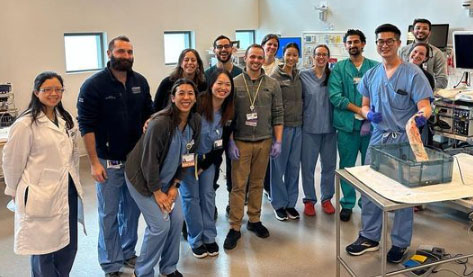
The UConn Gastroenterology-Hepatology fellows’ clinical training includes patient care, procedures, and teaching opportunities at four hospital sites, resulting in exposure to a wide range of diseases and a diverse patient population. The GI service at each hospital provides consultative care to hospital inpatients and offers consultative appointments and endoscopic procedures to outpatients. Our program sites are affiliated with a liver disease & transplant center, an esophageal disease center, and a neurogastroenterology and motility center.
Sample block rotation schedule
Patient Care
Rotations in inpatient and outpatient care are required for all fellows. In all rotations, fellows work directly with supervising gastroenterologists.
During inpatient rotations, fellows participate in gastrointestinal (GI) consultations and perform procedures on hospitalized patients, as well as on outpatients. These experiences help fellows learn approaches to a wide variety of inpatient diagnostic and therapeutic GI problems. Our program’s inpatient assignments also include rotations in liver transplantation.
During outpatient rotations, fellows rotate through subspecialty clinics focused on areas such as esophageal disease and inflammatory bowel disease where they work directly with expert gastroenterologists. Fellows also participate in outpatient procedure blocks during these rotations. In addition, fellows have a half-day weekly continuity clinic experience with responsibility for the outpatient management of a group of assigned patients for the duration of the fellowship.
Procedures
All procedures are performed under the direct supervision of teaching faculty. Procedural training includes upper endoscopy, colonoscopy, esophageal dilation, esophageal and anorectal motility, esophageal pH testing, capsule endoscopy, paracentesis, and percutaneous endoscopic gastrostomy placement. Endoscopic experience also includes exposure to therapeutic endoscopy, which includes variceal banding and various stenting procedures. Opportunities for training in advanced procedures such as ERCP, EUS, radiofrequency ablation for Barrett’s esophagus, and others also exist at our training sites. At UConn, we also offer unique training in fecal microbiota transplantation for the treatment of illness associated with the dysbiosis of the gut microbiome, and transient elastography (FibroScan) for the diagnosis of liver disease.
Fellows utilize the American Gastroenterological Association’s online procedure log resource to keep track of their procedures, allowing for easy assessment of procedural skills learned during their three years of training.
Simulation
Fellows in our program utilize the Thompson Endoscopic Skills Trainer (TEST), a training tool designed to assess and improve endoscopic skills. As a training tool, the TEST is available for use by our first year fellows to familiarize themselves with endoscopic maneuvering before proceeding to patient procedures, and by all trainees to self-evaluate their progress throughout their training.
Teaching
Fellows in our program serve in a junior faculty-type role, directly supervising UConn and visiting medical residents and students on the team, together with the supervising physician. In the majority of their rotations and in their continuity clinics, our fellows also work closely with their co-fellows, which allows the more senior fellows to serve in a supervisory role to junior fellows in recognition of their progress toward independent practice. Fellows also have a responsibility to educate other house staff and nurses engaged in the care of patients with GI and liver disease.